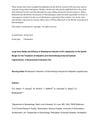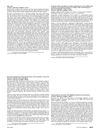Safety and Efficacy of Bimatoprost Solution 0.03% Topical Application in Patients with Chemotherapy-Induced Eyelash Loss
December 2013
in “Journal of Investigative Dermatology Symposium Proceedings”

TLDR Bimatoprost is safe and effective for treating eyelash loss caused by chemotherapy.
The study from December 2013 assessed the safety and efficacy of bimatoprost solution 0.03% in treating patients with eyelash loss due to chemotherapy. It involved 130 participants, with 96 receiving bimatoprost and 34 receiving a placebo. The double-masked, randomized, placebo-controlled trial lasted for one year, with 89.2% of patients completing it. After 6 months, those treated with bimatoprost showed significant improvements in eyelash growth on the Global Eyelash Assessment scale and in terms of length, thickness, and darkness, as confirmed by digital image analysis. Patients initially in the placebo group experienced similar improvements upon switching to bimatoprost from months 6 to 12. The treatment was generally well-tolerated, with the most common side effects being conjunctival hyperemia, punctate keratitis, upper respiratory tract infection, and eye pruritus. The conclusion was that bimatoprost is a safe and effective treatment for chemotherapy-induced eyelash loss.
View this study on jidsponline.org →
Cited in this study

research Pathobiology of chemotherapy-induced hair loss
Chemotherapy causes hair loss by damaging hair follicles and stem cells, with more research needed for prevention and treatment.

research Chemotherapy-Induced Alopecia
Scalp cooling might reduce hair loss from chemotherapy, but evidence is weak and other treatments are being tested.

research Skin toxicity of anti‐cancer therapy
Anti-cancer treatments can cause reversible hair loss, skin sensitivity, pigmentation changes, nail damage, and skin reactions, with a need for more research on managing these side effects.
Related

research Baricitinib Results in Eyebrow and Eyelash Growth in Patients With Alopecia Areata Who Do Not Achieve 20% or Less Scalp Hair Loss
Baricitinib helps grow eyebrows and eyelashes in severe alopecia areata patients.

research Bimatoprost for the treatment of eyelash, eyebrow and scalp alopecia
Bimatoprost is promising for treating some types of hair loss but needs more testing for androgenetic alopecia.

research Bimatoprost solution 0·03% topical application to the eyelid margin for the treatment of eyelash hypotrichosis
Bimatoprost solution 0.03% is effective for treating sparse eyelashes.

research Long‐term safety and efficacy of bimatoprost solution 0·03% application to the eyelid margin for the treatment of idiopathic and chemotherapy‐induced eyelash hypotrichosis: a randomized controlled trial
Bimatoprost solution is effective and safe for long-term use in treating eyelash thinning.

research The prostamide‐related glaucoma therapy, bimatoprost, offers a novel approach for treating scalp alopecias
Bimatoprost, a glaucoma medication, may also help treat hair loss.

research Long-term safety and efficacy of Latisse (bimatoprost 0.03% solution) for treatment of eyelash hypotrichosis in subjects with chemotherapy induced and idiopathic hypotrichosis
Latisse is safe and effective for long-term eyelash growth in people with thin eyelashes from chemotherapy or unknown causes.
research Topical bimatoprost for the treatment of eyebrow hypotrichosis.
Bimatoprost can help grow eyebrow hair.
research Bimatoprost in the treatment of eyelash hypotrichosis
Bimatoprost is effective for growing longer, thicker, and darker eyelashes.